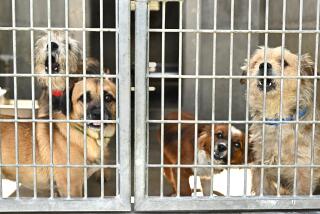Beijing dog lovers worry amid crackdown on large canines
- Share via
BEIJING — With his Lassie-like looks, QQ might seem like the kind of dog that would win kudos from cops for thwarting a break-in or rescuing a neighbor from a burning home.
But these days, the 2-year-old Scottish shepherd is in hiding on the eastern edge of the Chinese capital, his owners seeking to keep him out of sight of the police.
QQ’s downtown-dwelling owners have shelled out nearly $700 to keep their pooch boarded at a veterinarian’s office for a month, hoping that a crackdown on what Beijing police describe as “large and vicious dogs” will be eased.
The campaign — targeting canines that stand more than 13.8 inches at the shoulder, including greyhounds, chow chows and Dalmatians — has angered and panicked many Beijing dog lovers. By some estimates, there are about 2 million dogs in the city of 20 million, a remarkable figure considering man’s best friend was banned here in the 1980s (along with ducks, pigs and several other animal species).
Police began posting fliers around central Beijing last month, warning residents that large dogs were not allowed and that owners had 10 days to relocate theirs to the edge of the capital or beyond. Then, red-and-white warning banners began to appear even in suburbs such as Shunyi, where Labradors, German shepherds and other big breeds frolic on the lawns of homes that look as if they were transplanted from the cul-de-sacs of suburban America.
“We’ve had dozens of calls,” said Nis Peter Lorentzen, cofounder of Doctors Beck & Stone Pet Health Care Center, which has four branches in Beijing. “The notices have created a lot of chaos.”
Authorities say they are merely enforcing a rule that has been on the books for 10 years. But veterinarians, animal rescue groups and pet parents point out that thousands of “big” dogs have been legally registered for the last decade at local police stations. The licenses cost about $160 for the first year and $80 annually after that.
Some dog owners are afraid to renew the registrations for fear of having their pets seized; some have been walking their animals early in the morning or late at night to minimize the chance of encountering an officer on patrol.
With the official registration renewal period having ended June 30, dog fanciers are waiting to see if police will get even tougher or back off.
“I’m worried about it,” said Wilson Huang, who had paid $3.30 recently to bring his two Samoyeds — QiQi, 8, and Siling, 5 — to romp in the pet play area of Chaoyang Park in central Beijing, a district now supposedly off limits to large canines. “My dogs are registered, but I’ve heard that if they take them, it’s very hard to get them back, especially if it’s a good breed.”
Lorentzen and several other veterinarians in Beijing said they had no firsthand accounts of clients having their pets taken away on the streets, though some knew of incidents where police impounded dogs large and small after neighbors complained.
When a reporter anonymously phoned the Chaoyang district police station to inquire, an officer replied: “We are definitely confiscating big dogs; you should take them to the countryside. If it’s a big dog, you cannot register it.”
Online, tales are circulating of police hauling away dogs whose masters can’t produce registration cards. One video that went viral last week shows an elderly man on a curb, pleading with an officer not to take a fuzzy white dog he says he is caring for while its owner is out of town; the policeman, unmoved, tosses the animal into the back of a pickup.
Just what is motivating the crackdown remains murky since police say only that they are enforcing a law already on the books. Mary Peng, cofounder and chief executive of the International Center for Veterinary Services in Beijing, said one factor may be that as the number of dogs in Beijing has exploded, more people are showing up at hospitals with bites and scratches. The capital has also seen a jump in rabies cases, she noted, though she added that there are no records to indicate the increase is tied to big dogs.
“The ownership of dogs has increased so fast, police say, ‘We must do something, at least enforce the rules we have,’ ” said Lorentzen, of the pet care center. But he expects authorities to back off soon. “It’s too late to change the reality.... What are they going to do, put down 500,000 dogs?
“Besides,” he added, “there’s another issue: There’s no doubt that high-level officials have such dogs, and clearly those aren’t going to be banned.”
A number of Beijingers involved in animal welfare groups worry that the crackdown will make it even harder to find adoptive homes in China for larger dogs.
Chris Barden, an Orange County native who runs the Little Adoption Shop in the Shunyi area of Beijing, said he’s heard from other rescue groups that are actively trying to set up programs to find adoptive homes for their big dogs abroad — an idea he finds discouraging.
“Their best hope is that the dogs can leave the country? That’s embarrassing for China,” said Barden.
Peng believes that Chinese are getting more knowledgeable and sophisticated about dogs but that the society’s relationship with companion animals is in a formative stage.
“We still have two generations of people who didn’t grow up with dogs in their houses, who didn’t have casual contact with them,” she said. “First, attitudes will evolve and change, and then rules and laws will follow.”
Luo Ming, a 34-year-old designer, agrees that education and outreach are important. Luo, who was playing with Rourou, his 18-month-old Labrador, in Chaoyang Park last week, wore a homemade T-shirt that said “35cm ≠ danger” on the front and “Don’t Kill Friends” on the back.
Luo said he’s frustrated with the legal uncertainty.
“We’re so upset about Beijing, with this cloud hanging over our heads,” he said. “Next week we are going on a road trip, and then to Shanghai. My company has a branch there, and if I can legally register my dog there, I’m moving.”
Tommy Yang in The Times’ Beijing bureau contributed to this report.
More to Read
Sign up for Essential California
The most important California stories and recommendations in your inbox every morning.
You may occasionally receive promotional content from the Los Angeles Times.











